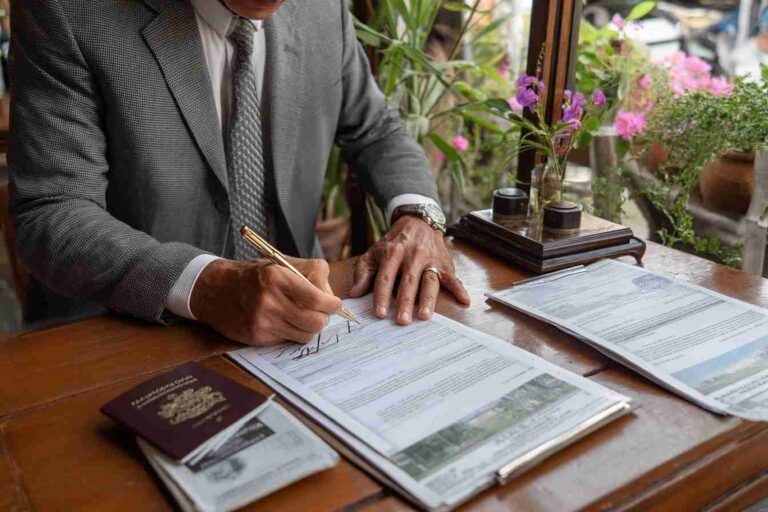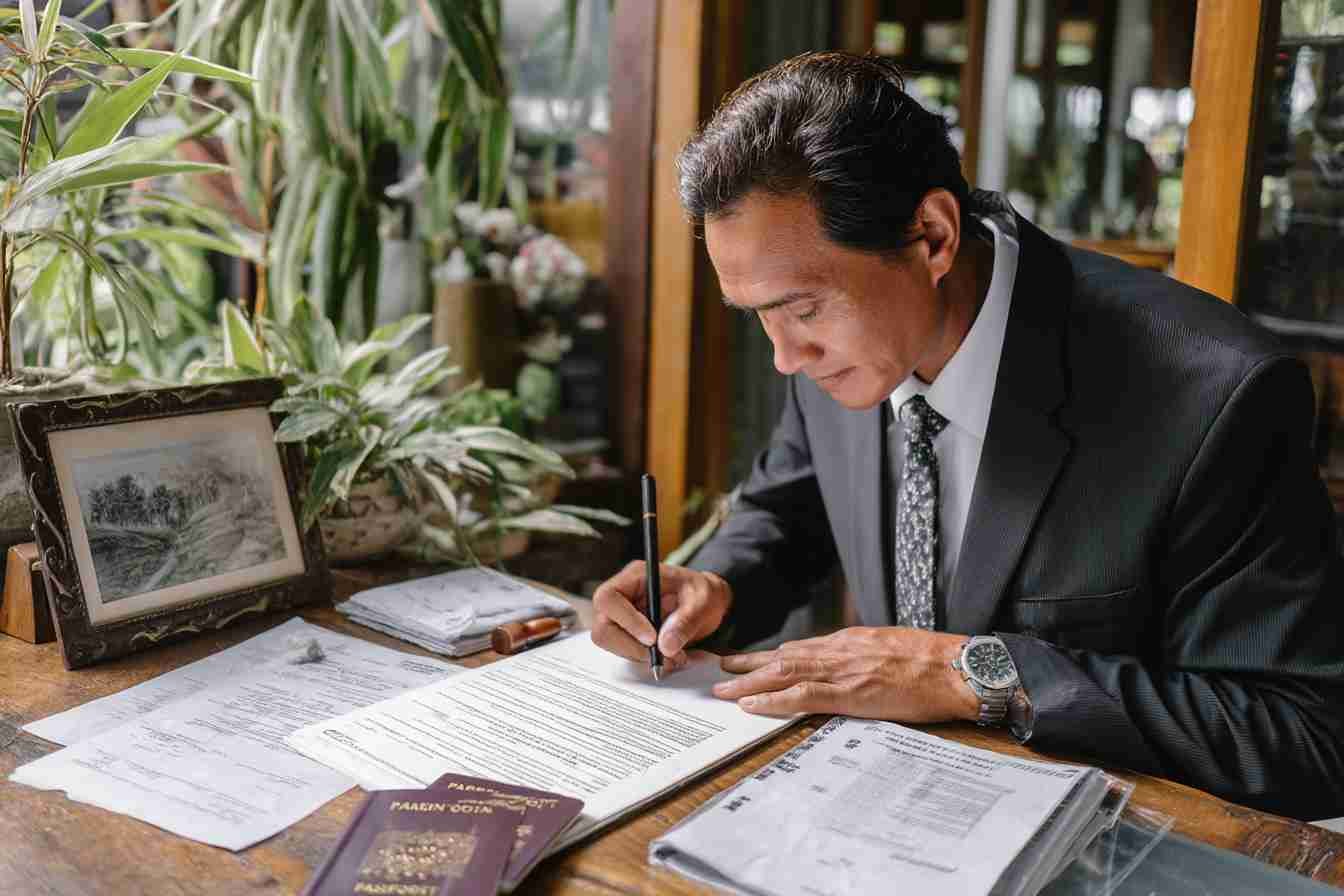
Many foreigners in Bali, Indonesia struggle with document approval because they don’t know whether to use an apostille or go through embassy legalization. The terms sound official and confusing, and using the wrong one leads to delays. 😕
😣 Imagine carefully preparing all your documents, only to be told days later that the destination country doesn’t accept apostilles. Or worse—having to start the process over because no one told you the country isn’t part of the Hague Convention. Time, money, and energy—wasted. ⏳
✅ Don’t worry. This guide breaks down the key differences between apostille and embassy legalization, when to use which, and how the 1961 Hague Convention makes things easier for some—while others still require more steps. 📘
🗣️ “I got an apostille for my birth certificate, but still needed embassy legalization for my visa to China,” said one digital nomad in Ubud. “I didn’t know China wasn’t a Hague member—wish I checked earlier!”
📌 If you’re sending a document to Japan, an apostille is enough. But if it’s for Canada, you’ll need to go through Kemenkumham, Kemenlu, and the Canadian embassy in Jakarta. Clear paths = fewer rejections. 🛡️
🚀 In this blog, we’ll walk you through when an apostille is sufficient, when you’ll need embassy legalization, and how to verify your destination country. Let’s get your documents accepted—fast and stress-free! 🌍
Table of Contents
- What Is the Hague Apostille Convention?
- Which Countries Are and Aren’t Members of the Hague Convention?
- What Is Embassy Legalization (for Non-Hague Countries)?
- When Do You Need Embassy Legalization in Bali, Indonesia?
- How the Apostille Process Works in Bali, Indonesia (via Kemenkumham and Kemenlu)
- Step-by-Step Guide to Embassy Legalization in Jakarta
- Common Mistakes to Avoid with Apostilles and Legalization
- How to Verify If Your Destination Country Requires Legalization
- Frequently Asked Questions
What Is the Hague Apostille Convention?
The Hague Apostille Convention is a 1961 international treaty designed to simplify the legalization of public documents for use abroad. 🌍
Instead of going through a long embassy process, member countries of the convention accept a special certificate called an “apostille.”
This one-page document proves your paperwork is genuine, making things like studying, working, or getting married in another country much easier. Just make sure both countries involved are members of the convention! ✅
Which Countries Are and Aren’t Members of the Hague Convention?
More than 120 countries are part of the Hague Apostille Convention, including the United States, United Kingdom, Japan, Germany, Australia, and Indonesia. If you’re sending documents to one of these countries, you just need an apostille.
But some of this countries like Canada, China, UAE, Egypt, Qatar and etc. aren’t members. ❌
If your destination is on this list, an apostille won’t be enough. You’ll need embassy legalization too.
What Is Embassy Legalization (for Non-Hague Countries)?
Embassy legalization is a multi-step process for documents going to countries that aren’t in the Hague Convention. 🏛️
First, your documents are verified by Indonesian authorities (Kemenkumham and Kemenlu).
Then, they’re taken to the destination country’s embassy in Jakarta for final approval. This ensures the documents are legitimate and acceptable.
This process is more time-consuming and requires more paperwork—but it’s absolutely necessary for certain destinations.
When Do You Need Embassy Legalization in Bali, Indonesia?
If you’re submitting documents from Bali to a non-Hague country, you’ll need embassy legalization. For example, documents for Canada (like a birth certificate or police clearance) must go through this full process. 📄
Even though you’re in Bali, your documents still need to be legalized in Jakarta. That’s where the embassies are located. Always confirm your destination country’s rules before sending documents, or speak with a legal expert or notary.
How the Apostille Process Works in Bali, Indonesia (via Kemenkumham and Kemenlu)
The apostille process starts with Indonesia’s Ministry of Law and Human Rights (Kemenkumham). They verify that the document is valid. 📑
After that, it goes to the Ministry of Foreign Affairs (Kemenlu), which issues the apostille stamp. 🏢
This makes your document recognized in any other Hague member country.
If you’re unfamiliar with the process, using a trusted agent can help things move faster and reduce stress.
Step-by-Step Guide to Embassy Legalization in Jakarta
1️⃣ Start with Kemenkumham for document verification.
2️⃣ Continue to Kemenlu (Ministry of Foreign Affairs) for endorsement.
3️⃣ Finish at the destination country’s embassy in Jakarta for legalization.
This applies to documents going to countries like the UAE, Egypt, or China. Always book appointments early, and check embassy rules ahead of time.
🔖 Missing a stamp or signature can delay your plans!
Common Mistakes to Avoid with Apostilles and Legalization
🛑 Submitting copies instead of originals.
🛑 Using expired or incorrectly signed documents.
🛑 Assuming all countries accept apostilles.
🛑 Forgetting to translate documents not in English or Bahasa Indonesia.
These mistakes often lead to rejections or delays. Double-check everything—or ask for help from a legalization expert in Bali. ✅
How to Verify If Your Destination Country Requires Legalization
Before doing anything, check if your destination country is in the Hague Convention.
❌ Countries Not Party to the Hague Apostille Convention (as of 2025)
These countries do not accept apostilles. For official documents to be valid in these countries, you’ll need to go through embassy or consular legalization instead.
Region | Countries |
🌏 Asia | China 🇨🇳 (Note: Hong Kong and Macau are members) Vietnam 🇻🇳 Malaysia 🇲🇾 Pakistan 🇵🇰 Nepal 🇳🇵 |
🌍 Middle East & Africa | United Arab Emirates 🇦🇪 Saudi Arabia 🇸🇦 Egypt 🇪🇬 Qatar 🇶🇦 Kuwait 🇰🇼 Morocco 🇲🇦 |
🌎 North America | Canada 🇨🇦 |
🌎 Central & South America | Guatemala 🇬🇹 Cuba 🇨🇺 |
🌍 Other Regions | Afghanistan 🇦🇫 Iran 🇮🇷 Iraq 🇮🇶 Algeria 🇩🇿 |
If the country is not listed, you’ll need embassy legalization. Still unsure? Call the embassy or consult an agent in Indonesia.
Skipping this step is risky. Better safe than sorry—especially when applying for visas, jobs, or school! 🎓🛫
Frequently Asked Questions
-
Is apostille the same as embassy legalization?
Not quite! Apostille is used between Hague member countries, while embassy legalization is needed for non-members. Know your destination’s status first. 🌐
-
How do I check if my document needs embassy legalization?
Visit https://www.mea.gov.in/Images/attach/ListofCountriesinApostilleConventonappendixb.pdf?utm_source=chatgpt.com to see if your destination country is in the Hague Convention. If not, legalization is required. 🔍
-
What if my document is in a foreign language?
You’ll need a certified translation in English or Bahasa Indonesia. 🈳
-
What are common reasons documents get rejected?
Mistakes like wrong notarization, expired documents, poor translations, or submitting photocopies instead of originals. Double-check everything! ❌
-
Can I fix and resubmit a rejected document?
Yes! Correct the issue and apply again. 💡
-
Do all documents need notarization first?
Not always. Some do, like affidavits. Others, like birth certificates, usually don’t. 📘








